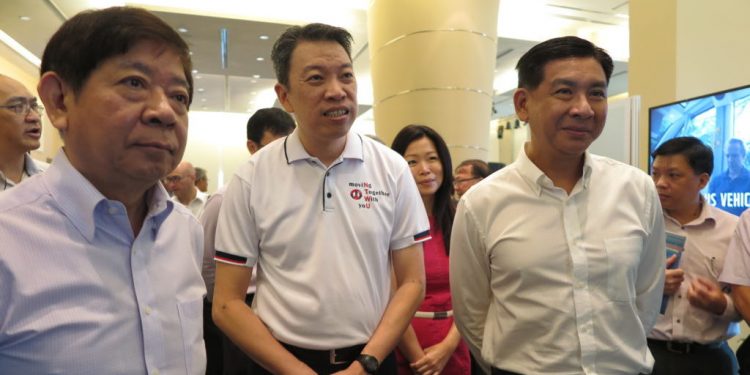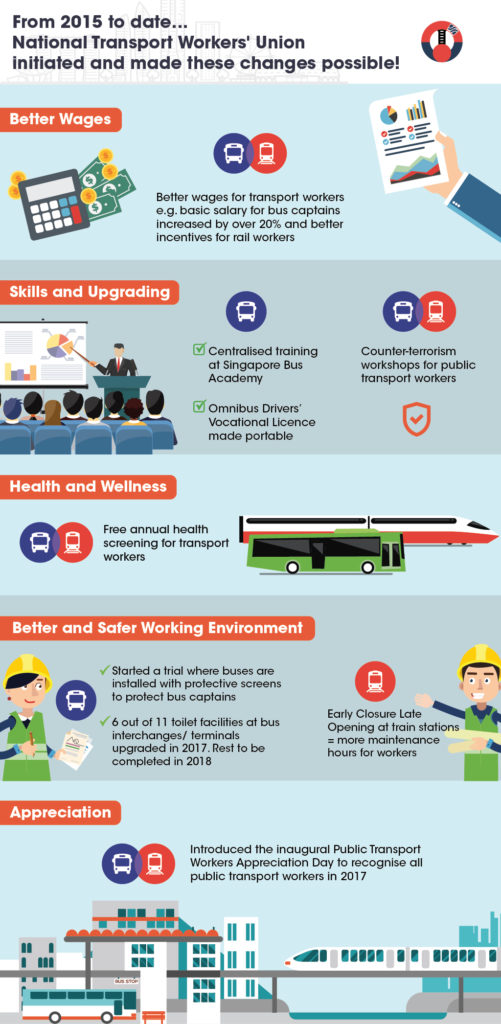Singapore’s public transport system has gone through quite a roller coaster ride in recent years. While we try to overcome the major system expansion, upgrading and maintenance which are happening concurrently, our transport workers are working very hard behind the scenes to make sure everything runs the way it should.
It has been two years since I joined the National Transport Workers’ Union (NTWU) as its Executive Secretary, and the journey has been an eye-opener. It was this journey that allowed me to witness what most of us do not get to, and that is all the hardworking and professional workers behind our public transport system.
Are these workers under-appreciated and should we appreciate them more? Of course!
Can we also do more to help make their work easier, most importantly, prepare them for all the technological changes that are likely to change how the industry works? We must!
Slowly but surely, public transport jobs are transforming
The past two years have seen our bus and rail networks expand significantly, with an injection of 1,000 new buses and the opening of the Downtown Line. Major upgrading works were also initiated and are still ongoing on the older North-South, East-West Lines. The introduction of the Bus Contracting Model in 2016 brought in new Public Bus Operators (PTOs) and a new culture for our bus workers. These developments impact our public transport workers in various ways and the NTWU has to constantly look ahead, assess and ensure that the well-being and welfare of our transport workers are taken care of amidst all these changes.
To do so, the NTWU’s 320-strong team of dedicated union leaders has been working hard on the ground to gather feedback and working closely with the PTOs and the authorities to implement changes that benefitted many of our transport workers.
Not forgetting our logistics and port workers…
Unknown to many, in addition to public transport workers, the NTWU looks after a smaller group of logistics and port workers/officers. Most recently, we locked in a 5-year agreement with the Maritime & Port Authority and Jurong Port to build port employees’ competencies by developing and implementing internships, work-study programmes and overseas training attachments.
On the logistics front, the union has been working with industry partners to improve the jobs of our heavy vehicle drivers, including reviewing the queue systems at the yards to enhance the effectiveness and efficiency, and to adapt best practices for use at the different yards. I did a job attachment with a prime mover driver and I witnessed first-hand the challenges they face on the job. One of my priorities is to explore with the authorities on the feasibility of creating purpose-built heavy vehicle parks with proper rest, food and toilet facilities. Shuttle services can be provided from these heavy vehicle parks to the nearest MRT stations.
Help! Driverless vehicles are coming…
The industry currently has its hands full, juggling the major maintenance, upgrading and expansion of our transport network, implementing the Bus Contracting Model, as well as preparing the industry for autonomous vehicles.
Do we need to be more nervous about how technology could impact the industry, the jobs and the workers? Yes! In fact, I have been losing sleep over the following:
- How fast will the industry adopt autonomous vehicles?
- Some new towns are already planning to pilot autonomous shuttle services, how much lead time do we have to transit?
- If we go driverless, what jobs would be affected? How would they be affected?
- How many drivers will be replaced? If the drivers lose their jobs, where can they go?
- How would these changes affect the Bus Contracting Model? Would this impact the tender price of each bus package, and in turn affect things like drivers’ wages and compensation package? Would it encourage the tender process to consider things like creation of higher-value jobs as technology plays a bigger role in the industry?
- For those who are not drivers, how will they be affected? Similarly, where can they go?
- At the back of all these changes, how can the workers be seamlessly trained? Would there be greater push for continuous learning? Would the employers provide training hours for the workers to learn new skills?
What are our next steps?
Today, the tripartite partners launched the Land Transport Industry Transformation Map (ITM). And hopefully, this will help me sleep better!
As the industry evolves rapidly with technological developments, a key objective of the ITM is to prepare and transition the workers through these changes with ease, at the same time, develop and build a workforce that is well-equipped to take on future and higher-value jobs.
The Land Transport ITM provides a clear direction for the industry moving into the next decade. Now, what we need to do is to operationalise it.
The union, management partners and the Government need to adopt an all-hands-on-deck approach to:
- Identify future jobs that workers can transition into
- Identify the relevant skills required
- Design holistic training programmes for new and current workers
- Put the workers through the necessary training and skills upgrading to future-proof themselves
For a start, the union is discussing with the Singapore Bus Academy to co-design training programmes for our current drivers.
Moving together as one
The workforce is the most important part of the industry’s transformation. They form the heart and core of the industry, and they are key to keeping our transport system running. Thus, it is important that we always remember to show appreciation to all public transport workers – bus captains, train captains, interchange and station staff, as well as those “behind-the-scene” maintenance crew. To that, the union will continue to raise public awareness on the work that our transport workers do. The community can help by extending a smile or giving an encouragement to our public transport workers as you take the bus or the train.
Lastly, to all our transport workers – the union is committed to be with you every step of the way as we transform our land transport industry. We will be moviNg Together With yoU.
This is a post by National Transport Workers’ Union Executive Secretary, Melvin Yong. Any extracts should be attributed back to the author. 12 February 2018.


